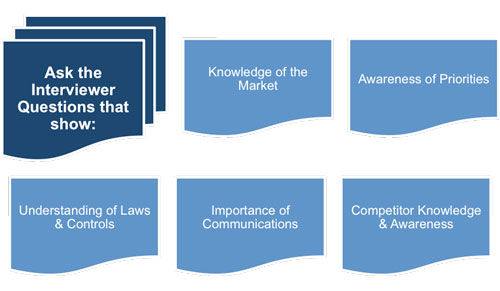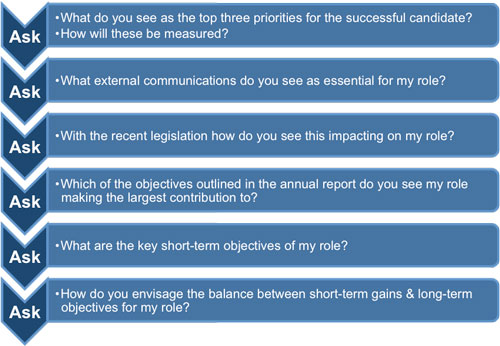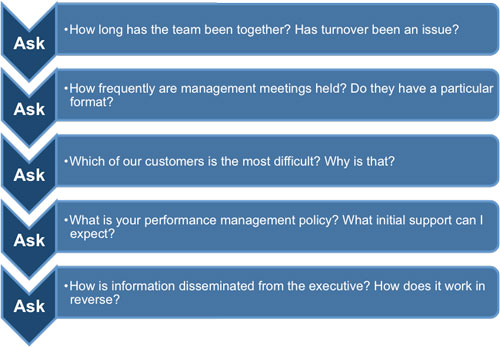Questions You Should Ask
An interview gives you the opportunity to ask questions and it is important to think about these and prepare carefully. Make sure that you have read all of the documentation you have been given so that you don't ask a question that you've already been given the answer to.
The things you learn in your preparation for the interview should enable you to ask questions that demonstrate your understanding of the issues and responsibilities you will face in the role. This becomes more significant the farther along the recruitment process you are.
 |
Organizations want employees who will add value and make a contribution beyond just doing the basics of the job. Asking questions that demonstrate that you are one of these people can make a positive impression on the interviewer. For example:
 |
These questions could make you stand out from the other candidates. The best approach is to ask just enough questions to demonstrate you are serious about wanting the position, knowledgeable about the organization and its environment, and most importantly that you are someone who can be proactive and add value.
Have the questions you'd like to ask written down and ensure that as many as possible are open questions. Ask for a few seconds to look through the questions you have prepared and use this time to search through your prepared list to select those most pertinent depending on what has been discussed in the interview so far. Avoid coming across as conceited but do not be afraid to ask searching questions, for example:
"I notice that XYZ offers its new customers 'Q product.' Is this something ABC have considered? Does it fit in with their service philosophy stated by the CEO in the annual report?"
With this type of question make sure you have also noted what this philosophy and Q product were. This will enable you to give an intelligent response if the question is returned and gives you the opportunity to express your view.
As a manager it is also worthwhile asking questions about your team, management colleagues, and third parties. For example:
 |
It is essential to keep your eye on the clock as you don't want your interview to over-run. You can also assess the mood of the interviewer from his or her body language. Let the interviewer know you are conscious of the time and ask if you can continue to ask questions. Consciously keep the balance of power with the interviewer. If time has run out, ask if they would prefer you to email questions to them or ask them at the next stage. This subtly asks if you have been selected or not.
Ensure the phrasing of your question does not put the interviewer in an awkward position or embarrass them because they don't know the answer. For example, asking detailed technical questions of HR personnel may result in a negative reaction and influence their decision.
By the end of your interview your objective is to have made a strong and favorable impression. You should also ensure that you leave knowing what will happen next and to ask for feedback if you are unsuccessful.
One thing to remember is that the interview is a two-way process and it gives you the opportunity to see at first hand what the organization is like and to get a feel for the role beyond what you already know from the job specification.
Don't let your keenness to get a new job blind you to anything you see on the day that gives you cause for concern. You should pay particular attention to the following:
1. What does the physical environment look like?
o Are the premises clean and tidy looking?
o Is the technology and equipment up to date?
If they are not then this could indicate chronic underfunding, which means working there could be stressful because you'll constantly be battling against budget constraints. Underfunded organizations typically have little opportunity for financial rewards even if you do your job well.
2. Do the people look reasonably relaxed?
Try to arrive ten minutes early with the intention of observing those who work in the organization and their interactions with others. Ask yourself:
o Is the atmosphere relaxed and professional?
o Do people look reasonably happy?
o Do the receptionists sound stressed?
o Does it feel too quiet and oppressive?
Your answers will give you a feel for how well you would fit into the prevailing culture. There are some truly grim places to work and you don't want to find yourself stuck in one. It takes a lot of time and effort to change jobs so make sure that it suits you.
3. Make an objective assessment of your interviewer.
o Do you feel this is someone you could work for?
o Do you feel they can be trusted?
o Do you feel they are being honest with you?
The interviewer may be the only person working in the organization that you are able to actually meet. There can sometimes be a difference between an organization's real values and those in its PR material. The interviewer's attitude and demeanor can often tell you a lot about the prevailing culture. This is not a trivial matter because they may turn out to be your immediate boss.
4. Does the role match your expectations from the ad and other material you've received?
o Is the job specification the same as you've been sent?
o Are there any responsibilities that were omitted from the ad?
o Is there any aspect of the job that the interviewer seems reluctant to discuss?
Subtle changes do occur as organizations respond to external circumstances, and this can account for minor differences in the role you applied for and the one on offer. However, if there has been a high turnover of staff in a particular role because of an ongoing problem, then the interview may try to play this down. It is essential to actively listen to the interviewer at all times and to clarify anything that seems incongruous.
You may also be interested in:
Interview Questions | Interview Behavior | Capability Questions | Commitment Questions | Compatibility Questions | Questions About Your Self-Image | Questions About Your Application | Questions You Should Ask.


